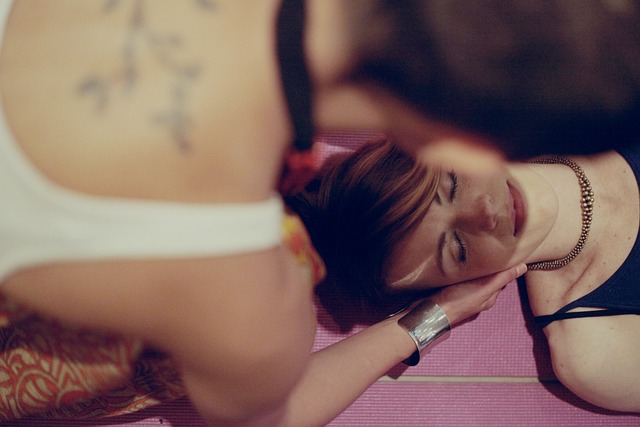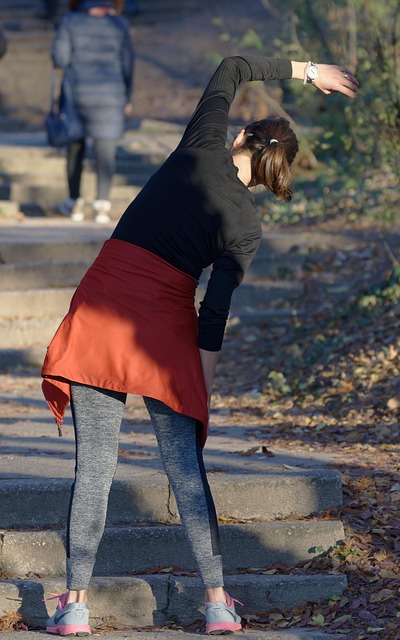The body positivity movement in fitness promotes inclusivity and acceptance of all body types, shifting the focus from external aesthetics to personal health journeys. By emphasizing wellness solutions tailored to individual needs, this approach creates supportive environments where people can engage in activities they enjoy without feeling judged. Key elements include stress relief techniques like mindfulness exercises, mental health support through emotional well-being strategies, personalized fitness routines, and healthy lifestyle tips. Adopting these principles fosters self-love, acceptance, and a holistic approach to wellness that caters to diverse skill levels and dietary needs.
In today’s world, body positivity is transforming the fitness landscape, making it a vibrant tapestry of inclusive options. This article explores how individuals can embrace their unique bodies while pursuing wellness, regardless of skill level. We delve into the core principles of body positivity in fitness, debunking myths and fostering self-acceptance. Through tailored personal wellness plans, we guide readers from beginners to advanced athletes, offering stress relief techniques and mindfulness exercises to enhance mental health support. Discover healthy lifestyle tips, balanced diet plans, and self-care practices for a holistic approach to fitness and emotional well-being.
- Understanding Body Positivity in Fitness
- – Defining body positivity and its relevance to fitness.
- – Debunking myths about body image and size.
- Creating Personal Wellness Plans
Understanding Body Positivity in Fitness

Body positivity in fitness is a movement that promotes embracing and celebrating bodies of all shapes and sizes, emphasizing that fitness is for everyone, regardless of their physical appearance. It encourages individuals to focus on their health and wellness journey rather than solely on achieving a certain aesthetic. This approach challenges traditional beauty standards and the idea that fitness success is only measured by external looks. By adopting body-positive principles, people can develop healthier relationships with their bodies, fostering self-love and acceptance.
This mindset shift is crucial for creating an inclusive fitness environment where everyone feels comfortable and motivated to engage in activities they enjoy. It involves incorporating stress relief techniques like mindfulness exercises and promoting mental health support through emotional well-being strategies. For instance, encouraging participants to practice self-care is essential; this can include healthy lifestyle tips such as balanced diet plans and tailored fitness routines designed to cater to different skill levels.
– Defining body positivity and its relevance to fitness.

Body positivity is a movement that celebrates and embraces diverse body types and shapes, promoting the idea that every individual deserves to feel comfortable and confident in their own skin. It encourages individuals to focus on overall health and wellness rather than solely on appearance. When applied to fitness, body-positive approaches emphasize including everyone, regardless of size or ability, in physical activities and creating an environment where people can engage in exercises that align with their personal goals and preferences.
This concept is crucial for fostering a healthy relationship with fitness. By offering accessible wellness solutions for individuals at all skill levels, from beginner to advanced, we can provide tailored personal wellness plans that incorporate stress relief techniques, mindfulness exercises, and emotional well-being strategies. Moreover, promoting healthy lifestyle tips, such as balanced diet plans and self-care practices, ensures that people feel supported in their fitness journeys, not just physically through fitness routines but also mentally and emotionally through mental health support.
– Debunking myths about body image and size.

In today’s world, it’s essential to challenge and redefine the narrative surrounding fitness and body image. Many myths persist, often perpetuated by media and societal standards, which can be detrimental to an individual’s emotional well-being and mental health. One common misconception is that fitness is solely about achieving a specific body size or shape, but this couldn’t be further from the truth. Wellness solutions for individuals come in diverse forms, catering to various skill levels and preferences. Fitness routines are not one-size-fits-all; they should be tailored to enhance overall health and happiness rather than focusing solely on physical appearance.
Debunking these myths encourages people to embrace their unique bodies while prioritizing personal wellness plans. Incorporating stress relief techniques like mindfulness exercises, along with healthy lifestyle tips, can transform fitness into a holistic experience. By combining balanced diet plans with self-care practices, individuals can foster emotional well-being and discover that fitness is a journey of self-discovery, not a race to meet external beauty standards. This shift in perspective empowers people to engage in physical activities they genuinely enjoy, whether it’s dancing, hiking, or yoga, knowing that mental health support is integral to their overall wellness.
Creating Personal Wellness Plans

Creating Personal Wellness Plans
Every individual has unique needs and goals when it comes to their wellness journey. One of the most effective ways to embrace a body-positive fitness approach is by designing personalized wellness plans that cater to diverse skill levels. These plans should go beyond traditional exercise routines, incorporating a holistic blend of stress relief techniques, mindfulness exercises, and healthy lifestyle tips. By integrating these practices, individuals can foster both physical and mental health improvements, setting the foundation for long-term success.
Personal wellness plans allow you to explore fitness routines tailored to your comfort level, whether it’s gentle yoga for beginners or high-intensity interval training for advanced practitioners. Balanced diet plans are also crucial components, focusing on nutritious foods that fuel your body without restrictions. Additionally, self-care practices such as regular meditation or journaling can significantly enhance emotional well-being strategies and provide much-needed mental health support.
Body positivity and fitness go hand in hand, promoting a healthy relationship with one’s body through personalized wellness solutions. By creating tailored personal wellness plans that incorporate stress relief techniques, mindfulness exercises, and balanced diet plans, individuals can embrace their unique journey towards self-care practices and emotional well-being strategies. Fitness routines, when aligned with mental health support, become accessible tools for enhancing overall life quality, ensuring everyone, regardless of skill level, can benefit from these healthy lifestyle tips.
